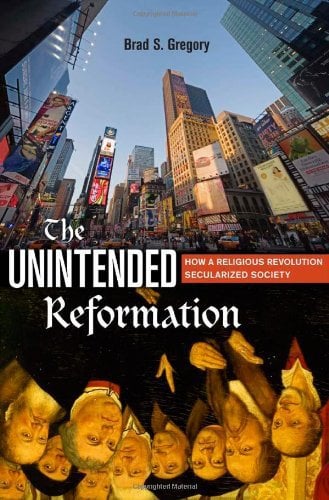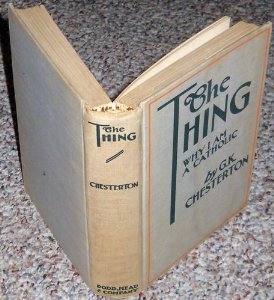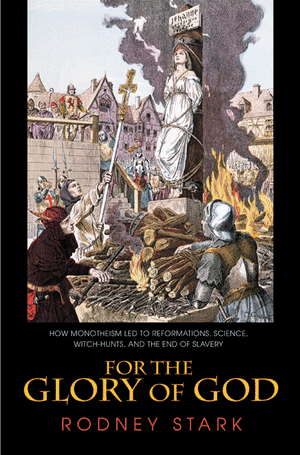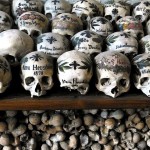
Reformation Day: it’s my day to resist the temptation to take unjustified swipes at our heretical brothers and sisters in Christ. This is why I won’t be dredging up passages like this one from G.K. Chesterton’s The Thing:
“If it be profane that the miraculous should descend to the plane of matter, then certainly Catholicism is profane; and Protestantism is profane; and Christianity is profane. Of all human creeds or concepts, in that sense, Christianity is the most utterly profane. But why a man should accept a Creator who was a carpenter, and then worry about holy water, why he should accept a local Protestant tradition that God was born in some particular place mentioned in the Bible, merely because the Bible had been left lying about in England, and then say it is incredible that a blessing should linger on the bones of a saint: why he should accept the first and most stupendous part of the story of Heaven on Earth, and then furiously deny a few small but obvious deductions from it—that is a thing I do not understand; I never could understand. I have come to the conclusion that I shall never understand. I can only attribute it to Superstition.”

No, let’s deal with something more serious instead. I’ve been reading through Rodney Stark’s (gear up for it, it’s a mouthful) For the Glory of God: How Monotheism Led to Reformations, Science, Witch-Hunts, and the End of Slavery, because I have to read it as a TA for a religion and world politics class. The chapters on witchcraft (witch burning was mostly a Protestant thing that the Inquisition limited in Catholic territories) and slavery (the middle ages totally eradicated slavery and the Renaissance popes were practically the only early opponents of its modern reincarnation) are especially fascinating.
But we’ll ignore those in order to concentrate upon the first chapter that deals with the theological pluralism of Christian history. The basic argument is that there have always been schismatic movements within the church Catholic. When seen in that perspective the 16th century wasn’t anything to write home about. There was no Golden Age of unity to start with.
What I find troubling is how Stark introduces a dialectic between the “church of power” and the “church of piety.” The Reformation is presented as a reaction of the church of piety against the Rome-based church of power. It seems to me, given how much reformers deferred to rulers of emerging nation-states, the Reformation might be best understood as a new church of power, a kind of infinitely refracted return to Constantinianism after a few glorious periods where the Church went as far as bossing around recalcitrant secular governments.

Those pushing for the “democratization” and “decentralization” of the Catholic church also forget that the priesthood of all believers created as many problems as it solved (George Weigel is as guilty as Maureen Dowd). Case in point, this is the fallout of the horrendously under-reported revelations from Billy Graham’s grandson:
“While comparing evangelicals to Catholics on abuse response, ‘I think we are worse,’ he said at the Religion Newswriters Association conference, saying too many evangelicals had ‘sacrificed the souls’ of young victims…
‘The Protestant culture is defined by independence,’ Tchividjian said. Evangelicals often frown upon transparency and accountability, he said, as many Protestants rely on Scripture more than religious leaders, compared to Catholics.
Abusers discourage whistle-blowing by condemning gossip to try to keep people from reporting abuse, he said. Victims are also told to protect the reputation of Jesus.”
You can read the full RNS report here.
Now aren’t you glad that the Catholic Church has accountability structures not available in other denomination, religions, or in the secular world? You’ll realize the secular world is frighteningly dangerous for your kids after you read the following data. So don’t keep your kids away from the clergy (Catholic or Protestant), keep them away from yourself, your family, and your friends. They aren’t much safer in the schools either according to this report.
Now go and take your kids to your local pastor or priest and give them a hug. The statistics say they’re much less perverted than the rest of us who don’t submit to the extreme sublimation and repression of ascetic practices.
How is that for a mild ecumenical gesture? I admit there’s a Halloween creepy element to it as well.
In slightly more stale news: Luther’s lavatory thrills experts!
===========================================================
While you’re at it take a look at the Cosmos TOP 10 lists about the following topics: recent theology, poetry, novels, heaven and hell, religion and world politics, science, and books I’ve cheated on [to be continued tomorrow with an installment on fiction and poetry].











